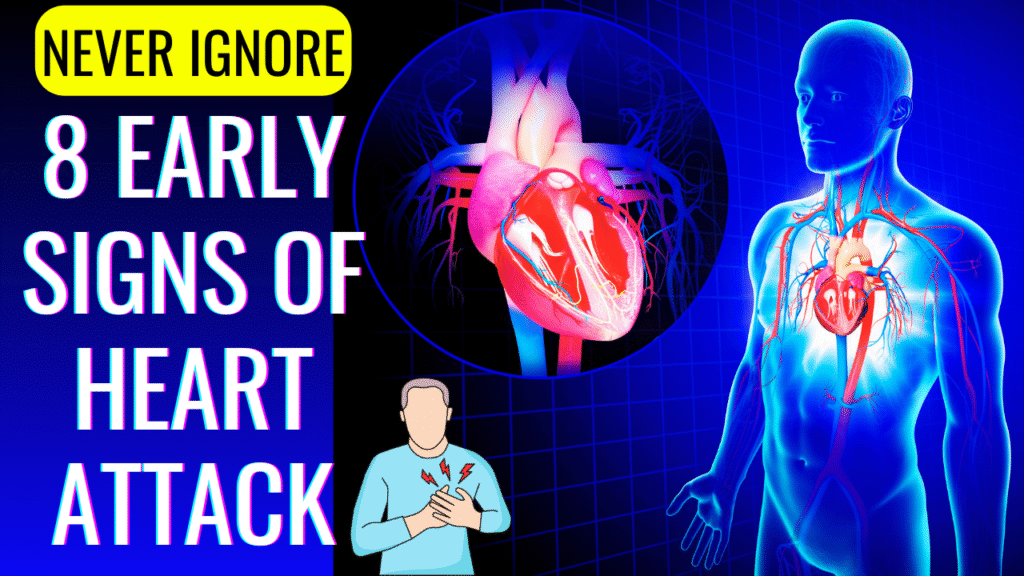
Today, we’re covering a life-saving topic: Early Signs of Heart Attack You Must Know and How to Prevent Heart Attack Naturally.
A healthy heart is essential for overall well-being. It pumps oxygen-rich blood to every organ, supporting life itself. But did you know that heart attacks (medically called myocardial infarctions) are among the leading causes of death worldwide? Understanding the early warning signs of heart attack can help you or your loved ones take quick action and save lives.
❤️ What Is a Heart Attack?
A heart attack happens when blood flow to a part of the heart becomes blocked—most often due to a blood clot or buildup of fatty deposits in the arteries. Without oxygen and essential nutrients, heart muscle cells begin to die, which can lead to permanent heart damage or even fatal consequences if not treated immediately.
8 Early Signs of Heart Attack You Should Never Ignore
1. Chest Pain or Discomfort
The most common and well-known symptom. You may feel pressure, tightness, squeezing, or pain in the chest area. This discomfort can spread to the arms, back, neck, jaw, or stomach.
2. Body Pains
Unexpected pain in areas such as the arms (especially the left arm), back, neck, jaw, or abdomen. These aches may be constant or intermittent and are often mistaken for muscle strain.
3. Excessive Sweating
Sudden, profuse sweating not linked to exercise or heat, often accompanied by cold, clammy skin, is a key warning sign.
4. Unusual Fatigue
Feeling extremely tired or exhausted without a clear reason—even during rest or light activity—could signal heart trouble.
5. Shortness of Breath
Struggling to breathe, especially when doing simple tasks or even at rest, may be accompanied by chest tightness or discomfort.
6. Lightheadedness or Dizziness
A sudden sensation of faintness, dizziness, or feeling lightheaded can indicate poor blood circulation to the brain caused by heart issues.
7. Heart Palpitations
Rapid, irregular, or unusually strong heartbeats, often described as fluttering or pounding, can signal an impending heart attack.
8. Indigestion or Heartburn-Like Discomfort
Unexplained indigestion, burning sensations, or discomfort in the chest or upper abdomen—often mistaken for acid reflux—can actually be early signs of heart disease, particularly in women.
Important: If you or anyone around you experiences these symptoms, seek immediate medical help. Quick action can save lives and prevent serious complications.
6 Proven Steps to Prevent Heart Attack Naturally
1. Adopt a Heart-Healthy Diet
- Eat more fruits, vegetables, and whole grains.
- Opt for lean proteins like fish, poultry, and legumes.
- Avoid trans fats, excessive cholesterol, and high sodium.
- Choose healthy fats from nuts, seeds, and avocados.
2. Engage in Regular Physical Activity
- Aim for 150 minutes of moderate exercise or 75 minutes of vigorous activity weekly.
- Add strength training at least twice per week.
- Find enjoyable activities to stay consistent.
3. Maintain a Healthy Weight
- Calculate your BMI and target a healthy range.
- Set small, achievable goals and track progress.
- Focus on sustainable diet and lifestyle changes.
4. Manage Stress Effectively
- Practice yoga, meditation, and deep breathing exercises.
- Identify your stress triggers and use coping strategies.
- Prioritize regular self-care and relaxation.
5. Quit Smoking
- Get professional help through support groups or quit-lines.
- Consider nicotine patches or prescribed medications.
- Develop a plan to manage cravings and withdrawal.
6. Limit Alcohol Intake
- Follow recommended guidelines: up to 1 drink/day for women, 2 drinks/day for men.
- Avoid binge drinking.
- Try non-alcoholic alternatives in social settings.
Knowing the early symptoms of a heart attack and acting fast could be the difference between life and death. At the same time, adopting natural heart attack prevention methods helps build long-term heart health and prevents future risks.
Don’t wait—share this valuable information with your loved ones today and take charge of your heart health. Remember, prevention is better than cure.
